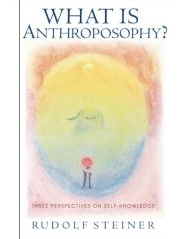Can you tell me more about Anthroposophy and why it is so important in Waldorf Education?
Ask Kytka Archives: May 31, 1999
Many people are drawn to Waldorf methods because they see the colorful and simple classrooms and they tend to believe that childhood is a magical time full of discussing trolls and fairies. But like it or not, Waldorf Education has its roots set strongly in the Anthroposophic Movement. A newcomer should pause and take a moment to think on what it is about “Waldorf” that attracts them and IF s/he even understands where it comes from…
From a brochure by the Anthroposophical Society in America:

Anthroposophy embraces a spiritual view of the human being and the cosmos, but its emphasis is on knowing, not faith. It is a path in which the human heart and hand, and especially our capacity for thinking are essential. It leads, in Steiner’s words, “from the spirit in the human being to the spirit in the universe”, because only if we first come to experience the spirit in ourselves can we know the cosmic spirit. But Anthroposophy is more than self development. Through it we recognize out humanity. Humanity (anthropos) has the inherent wisdom (sophia) to transform both itself and the world.
The Arts: Color, Form and Movement
Anthroposophy has contributed insights into all the arts: speech and drama, painting, sculpture, music, and the new art of Eurythmy. (A meaningful description of all these contributions is beyond the scope of this brochure, but we shall describe three.) Eurythmy translates the sounds, phrases, and rhythms of speech, or the dynamic element of music into movement and gesture. The result has been described as “visible speech,” or “visible song.” It could be called the movement language of the soul. In painting, the laws of color and form are not bound by matter. The painter who recognizes these laws, lets the colors themselves speak, opens the doors to art that embodies the spirit. In architecture, beyond blending beauty and function, buildings should be ecologically sound and reflect the character of the region or culture. They should provide an environment enhancing the physical, psychological, and spiritual well-being of the people who live and work in them.
Adult Education
Adult education centers provide learning and practice for those interested in renewing their private, professional, and social lives from a spiritual perspective. The programs balance study with inner development and artistic work, focusing on the potential for change and creativity. It is knowledge that leads to service in the world. Three centers offer a master’s degree in Waldorf education. Other programs such as weekend seminars and yearlong study groups are offered by various branches of the Society. There is also the Rudolf Steiner Institute in Waterville, Maine which offers three-week intensive seminars each summer.
Waldorf Education
Waldorf education is the fastest growing a dependent school movement in the world, with more than 600 Waldorf Schools world-wide, and more than 600 in the United States and Canada. It places as much emphasis on creativity and moral judgment as it does on intellectual growth. The curriculum integrates academics, artistic activity, and a unique teacher-student relationship to awaken a student’s reverence for beauty and goodness as well as truth.
Biodynamic Agriculture
The principles and practice of biodynamic agriculture relate to the earth as a living organism, within which each farm has its own identity. This approach builds upon established methods of sustainable agriculture compost, manures, soil and plants re treated with specially fermented herbal preparations that enhance the earth’s Organic processes and produce healthy, poison-free foods. At present, there are 10,000 acres under biodynamic management in the U.S. The Demeter Association is an independent agency that certifies biodynamic farms in the U.S. and abroad.
Medical Practice
Anthroposophically extended medicine does not regard illness as a chance occurrence or mechanical breakdown, but rather as something intimately connected to the biography of the human being. Handled appropriately it presents opportunities for new balance and maturity. The patient is seen and treated holistically as a being of body, soul and spirit. This approach integrates conventional practice with new and alternative remedies, dietary and nutritional therapy, rhythmical massage, hydrotherapy, art therapy and counseling.
Care for the Elderly
The Fellowship Community in New York is an intergenerational community focusing on care for the aging. A farm, craft shops for weaving, pottery and candle making, workshops for printing, woodwork and metalwork, a gift shop, a medical practice, study groups and an active cultural life ensure that growing old does not mean growing apart from the nurturing rhythms of day-to-day life. Because coworkers and their families live in the community, both young and old have the opportunity to learn from and to nurture each other. Along with the Fellowship Community, there is also the Hesperus Community in Toronto, and the lona Project in Sacramento.
Curative Work: Soul Care for Those in Need
Anthroposophical work in curative education and social therapy is based on the assumption that every individual, regardless of ability, is an independent spiritual being. Developmental disabilities and mental retardation are treated not as illnesses, but as part of the fabric of human experience, and are cared for in the context of a healthy home and community life.
![]() Audio Lectures by Eugene Schwartz
Audio Lectures by Eugene Schwartz
To order these amazing lectures on Audio/CD, Click here.
The most complete life & biography of Rudolf Steiner online, click here
Suggested Reading:
<A HREF=”http://ws.amazon.com/widgets/q?ServiceVersion=20070822&MarketPlace=US&ID=V20070822%2FUS%2Fwaldorfhomesc-20%2F8003%2F7398042b-7119-4ea9-a709-35d13f9d80ef&Operation=NoScript” mce_HREF=”http://ws.amazon.com/widgets/q?ServiceVersion=20070822&MarketPlace=US&ID=V20070822%2FUS%2Fwaldorfhomesc-20%2F8003%2F7398042b-7119-4ea9-a709-35d13f9d80ef&Operation=NoScript”>Amazon.com Widgets</A>
Many people are very interested in Waldorf philosophies but tend to want to turn away from anything Anthroposophical… I understand that and each person makes his or her own choice, however, I do firmly believe that respect for Anthroposophy should be acknowledged, because after all, if there was no Anthroposophy, there would be no Waldorf.





















